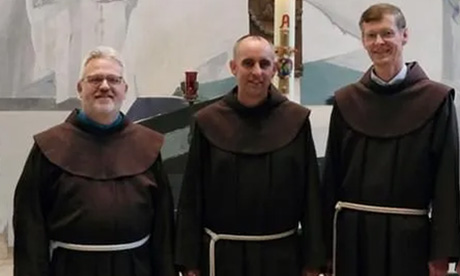A Franciscan province in Germany has elected an openly gay member as its new superior general.
Br Markus Fuhrmann (centre) publicly came out as homosexual a few weeks ago.
“If I am gay myself, then I want to show that I can also be part of the Church in this ministry,” he said in explanation of his coming out.
“That’s important because it’s not supposed to be like that in the Church. Unfortunately, there is too much institutional hypocrisy in our Church.”
He said his Franciscan brothers knew of his homosexuality at the time of his election. “It was very good for me to know that this is very positive for the brothers.
“I get a lot of encouragement, and maybe that spark of appreciation can spread to other areas of the Church. I think that’s good,” he added.
While Fuhrman supports the efforts of the Synodal Way, he said he’s “in favour of a critical rethinking of celibacy in the priestly way of life and I am in favour of women having access to ordained ministries.”
The new Franciscan leader was born on August 9, 1971, in Hannover. He made his simple vows in 1998, his solemn profession in 2003 and was ordained a priest on May 7, 2005.
In Cologne he ministered to the indigent. Before his election, he served as provincial vicar.
Today, he says “a big change is imminent, and I want and must shape it together with the brothers.”
The Church’s teaching on homosexuality
Catholic teaching on homosexuality is summarised in sections 2357, 2358, and 2359 of the Catechism of the Catholic Church.
The Church teaches that homosexuals “must be accepted with respect, compassion and sensitivity. Every sign of unjust discrimination in their regard should be avoided”.
As the Catechism explains: “Basing itself on Sacred Scripture, which presents homosexual acts as acts of grave depravity, tradition has always declared homosexual acts are intrinsically disordered.
“They are contrary to the natural law. They close the sexual act to the gift of life. They do not proceed from a genuine affective and sexual complementarity. Under no circumstances can they be approved.”
Providing further guidance, the catechism says, “Homosexual persons are called to chastity.
“By the virtues of self-mastery that teach them inner freedom, at times by the support of disinterested friendship, by prayer and sacramental grace, they can and should gradually and resolutely approach Christian perfection.”
Source
Additional reading



